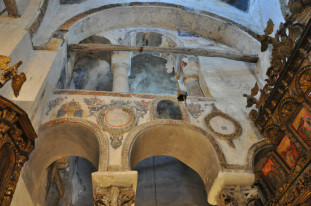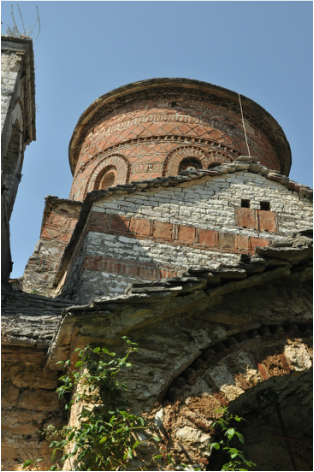
The dust-cloud carved a path through the countryside like a miniature whirlwind, shattering the peace of the hot afternoon. In the eye of this little storm was an elderly Mercedes taxi, bumping and rattling over the rough track. Its driver assiduously avoided potholes and large stones for the benefit of vehicle and passengers alike, trying out his few English words as he drove.
Forty minutes later, silence and stillness returned, the dust settled, and we stepped out into a different world.
We'd left behind the city of Gjirokastra: historic, scenic, bustling with shoppers and stall-holders, tourists and traffic.
We'd arrived at the tiny village of Labova e Kryqit - Labova of the Cross - where nothing stirred. It was siesta time, a Sleeping Beauty world: tools, ladders, a pickup truck, a jacket by a pile of roofing tiles, all abandoned until the temperature dropped.
Forty minutes later, silence and stillness returned, the dust settled, and we stepped out into a different world.
We'd left behind the city of Gjirokastra: historic, scenic, bustling with shoppers and stall-holders, tourists and traffic.
We'd arrived at the tiny village of Labova e Kryqit - Labova of the Cross - where nothing stirred. It was siesta time, a Sleeping Beauty world: tools, ladders, a pickup truck, a jacket by a pile of roofing tiles, all abandoned until the temperature dropped.

The Sleeping Beauty impression continued once we entered the churchyard. The church was a scenic jumble of unintentional angles, the subsidence of centuries lending character to an already picturesque design. Weeds were growing from crevices in the roof and the stonework. It felt ancient, untouched, the survivor of a different age; the muted click of the camera shutter sounded brash and alien, interrupting the holy sleep with disrespectful modernity.
By now, the taxi driver had located and awoken the keyholder and we stepped indoors, into deep, cool shade.
It was stunning.
This church, in the mountains of southern Albania, was founded in the mid-6th century. It holds within it both the artwork and the scars of the passage of time. Christ in Glory stares down from the cupola at finely carved pillar capitals, a highly ornate iconostasis, a matching pulpit. The richly gilded gates are open onto the altar beyond the screen. But it, too, is sleeping: awaiting the return of chant and incense and sacrament after the long years of repression.
The church is said to have been founded on the orders of the Emperor Justinian, and to have held a relic of the True Cross - hence the name of the village. Alas, the relic is no more; the church was ransacked during the turbulent and lawless years of the 1990s, and the relic was stolen.
But of course every church, every Christian life holds the True Cross - or should do so. Jesus calls us and all his followers to 'deny ourselves, take up our cross, and follow him.' It's a calling to be acted upon each and every day - there's no siesta from our vocation of faith; sleeping beauties within and beyond our congregations need to be awoken and stirred afresh with the good news of the Gospel.
Recent events, well-publicised in Peshawar and less well-publicised from other parts of the world, testify to the cost of the cross for those called as martyrs and their communities. Pray for them and their persecutors. Dietrich Bonhoeffer, himself a man who was put to death for his faith, famously said 'When Jesus Christ calls a man, he bids him come and die.' But for those of us in more peaceful, more fortunate places, there should still be the 'green martyrdom' of the everyday: its sacrifices, service and self-giving for the sake of the world, as we strive to live by grace in hope and love.
By now, the taxi driver had located and awoken the keyholder and we stepped indoors, into deep, cool shade.
It was stunning.
This church, in the mountains of southern Albania, was founded in the mid-6th century. It holds within it both the artwork and the scars of the passage of time. Christ in Glory stares down from the cupola at finely carved pillar capitals, a highly ornate iconostasis, a matching pulpit. The richly gilded gates are open onto the altar beyond the screen. But it, too, is sleeping: awaiting the return of chant and incense and sacrament after the long years of repression.
The church is said to have been founded on the orders of the Emperor Justinian, and to have held a relic of the True Cross - hence the name of the village. Alas, the relic is no more; the church was ransacked during the turbulent and lawless years of the 1990s, and the relic was stolen.
But of course every church, every Christian life holds the True Cross - or should do so. Jesus calls us and all his followers to 'deny ourselves, take up our cross, and follow him.' It's a calling to be acted upon each and every day - there's no siesta from our vocation of faith; sleeping beauties within and beyond our congregations need to be awoken and stirred afresh with the good news of the Gospel.
Recent events, well-publicised in Peshawar and less well-publicised from other parts of the world, testify to the cost of the cross for those called as martyrs and their communities. Pray for them and their persecutors. Dietrich Bonhoeffer, himself a man who was put to death for his faith, famously said 'When Jesus Christ calls a man, he bids him come and die.' But for those of us in more peaceful, more fortunate places, there should still be the 'green martyrdom' of the everyday: its sacrifices, service and self-giving for the sake of the world, as we strive to live by grace in hope and love.
 RSS Feed
RSS Feed